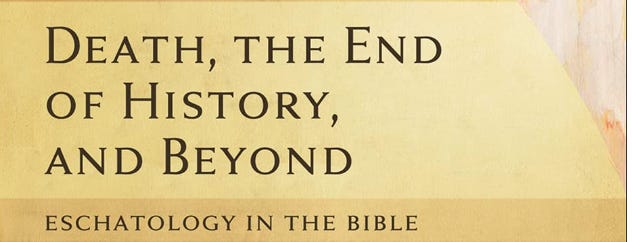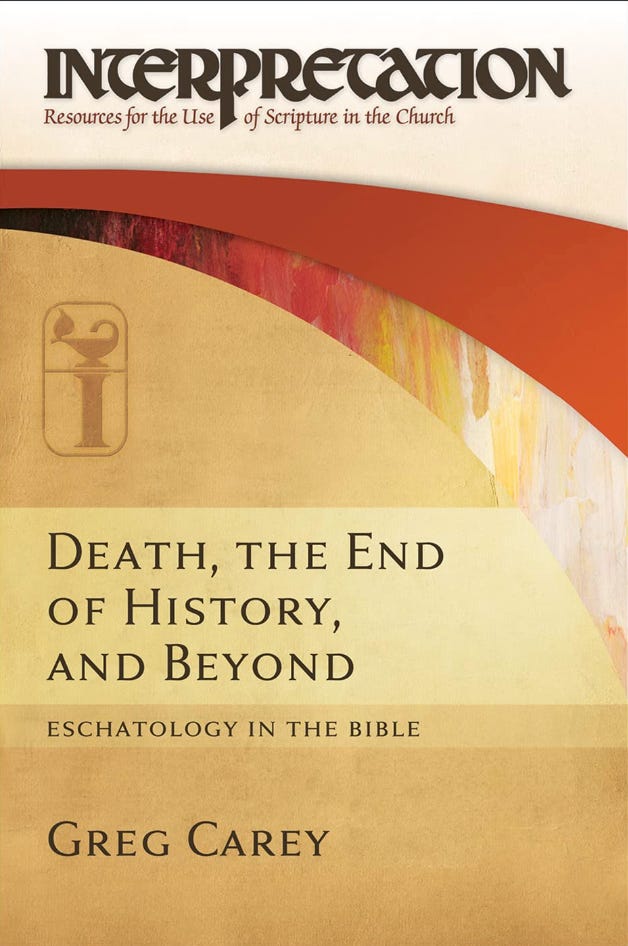If I think of one word that sums up Greg Carey’s fine book, Death, the End of History, and Beyond: Eschatology in the Bible, I think of the word “exploring.” Here we have a first-class scholar sorting through the various visions about the future in the Bible, tying them to realistic concerns of modern humans, in a way that explores the possibilities of the Bible.
He's not dogmatic; he’s cautious, careful, transparent, and respectful. He has put fundamentalist readings behind him, he’s embraced some critical judgments, and he wants to explore what life after death looks like for such a mindset. I found the book constantly refreshing and helpful.
I begin on another note, one I think Greg would appreciate. I am asked now, in light of Revelation for the Rest of Us, what the New Testament teaches about faith and politics or church and state or some version of that question. I’ve got a standard answer. Jesus asked his conversation partner to flip a coin and tell him whose image is on the coin and gave them a riddle: give to Caesar what is Caesar’s and to God what is God’s. He did not shy away from prophetic critique of the powers either. “Go tell that fox…” he said of Antipas. But Paul had a different way of talking church and state in Romans 13 and most would now say he may have been a little too accommodating, but whatever you think about Romans 13, the text suggests cooperating. Peter, however, had a different approach in 1 Peter 2:11-12, where he advocated public benevolence, and then he at least tapped Paul on the shoulder in 2:13-17 but then pushed a little harder than Paul on the need for Christians to be those who do good in the public sector. Then there’s the hotter attitude of Revelation that, well, turns against Rome/Babylon and announces the end of empire in the arrival of New Jerusalem.
No one answer can be found in the NT and it’s a mistake to synthesize it all into a formulaic posture of Christians toward the powers. Different times and settings call for different responses and postures.
The same is true for Carey when it comes to eschatology, or eschatologies.
So I have been waiting to read his last chapter because he does some constructive work. Some observations from his last chapter, which is worth more than the price of the book.
First, our eschatologies are shaped by our social setting and life. Those with little hope might like the advantages of a premillennial promise or even of an apocalyptic invasion, though one must admit many progressives like the apocalyptic Paul. Sam Perry tweeted last Saturday the strange connections of white Christian nationalists and their eschatological premillennial, pretribulation beliefs when contrasted with their postmillennial behaviors.
Second, our moderns have minimized heaven and the afterlife, while Carey explores how a view of the afterlife can help us do life better in the here and now.
Third, eschatology provides a meaning-making narrative to each of us. We are given a way to explain and make sense of tragedies and deaths and the mystery of what happens beyond the grave.
Fourth, the core of a Christian eschatology – and I’ve not heard it quite this way – can be discovered in the interplay of two categories: resurrection and Parousia (R&P). Leading to the following generative explorations:
Resurrection and Parousia means “God will right the very present evils with which we contend, not least the ones to which we contribute.” The interplay works out into “rectification and renewal” as the hope.
The “symbols” of R&P “articulate ways in which creation and election accomplish their fulfillment.”
R&P “reorients our attention toward God” and he draws this out in other ways in the rest of the chapter in very helpful ways.
The NT witness to resurrection “generally involves the transformation, or glorification, of the self and of fundamental continuity between our present and future selves.” Boom.
The Parousia “is one of several ways of imagining the ultimate rectification of all things, healing and renewal.”
Here’s one that may surprise: “the coming of Jesus also entails that we reject the myth of progress, even a post millennial myth.” Again, it’s about God: he explores the “if God” dimension and shows that humans simply cannot bring in the millennium or any utopia. We are more capable, actually, of burning the house down.
And, “hope for Jesus’s future reign challenges believers not to devote our hopes to the human enterprise, not ultimately. The Parousia empowers us to critique the present and to hope for something radically different. But it does remind us that God's future is qualitatively different from our own dearest desires; indeed, it judges them.”
Fifth, Carey then explores three images for “holy futures”: kingdom of God, New Jerusalem, and the messianic banquet. And, these “three symbols share two valuable features: they are world affirming, and they leave room for social interaction.”
I believe Carey has landed squarely on themes not only worthy of exploration but themes of major significance in the New Testament. He thinks the banquet theme best explains the other two, and I can’t say I’d disagree. But what I like about this is that his theology is grounded in God’s creation and redemption rather than it’s disruption and dissolving. The afterlife leads into social interaction rather than a heavenly choir room, and it values creation and our diverse human bodies.
Greg concludes the book with a hopeful exploration of universalism and a reflection on the value of inaugurated eschatology.
This is a good book and one that should be read by seminarians who take a course that deals with eschatology. Every major topic is here, and he shows how biblical scholars treat texts with caution and respect, and in the end he explores the value of eschatology from the angle of the Christian faith.






Thanks, Scot, for this exploration of Carey's new book. There is so much here that tickles my brain that any comment would tap into only one of the many exploring ideas Carey gives us. What I've loved is the challenge he brings again and again to notions embedded in evangelical thought that do need to be challenged! I've been playing with at least half a dozen different pieces of the puzzle for some time and I'm delighted that I'm not off in the weeds somewhere.
If I understand Esau Macaulley correctly, Rom. 13 should be read in the context of Moses challenge to Pharaoh which Paul mentions in chapter 9. Civil authorities could and should be challenged. Discernment is the missing factor. Even in Moses's life there was a time when challenge was not appropriate, but then the Exodus.